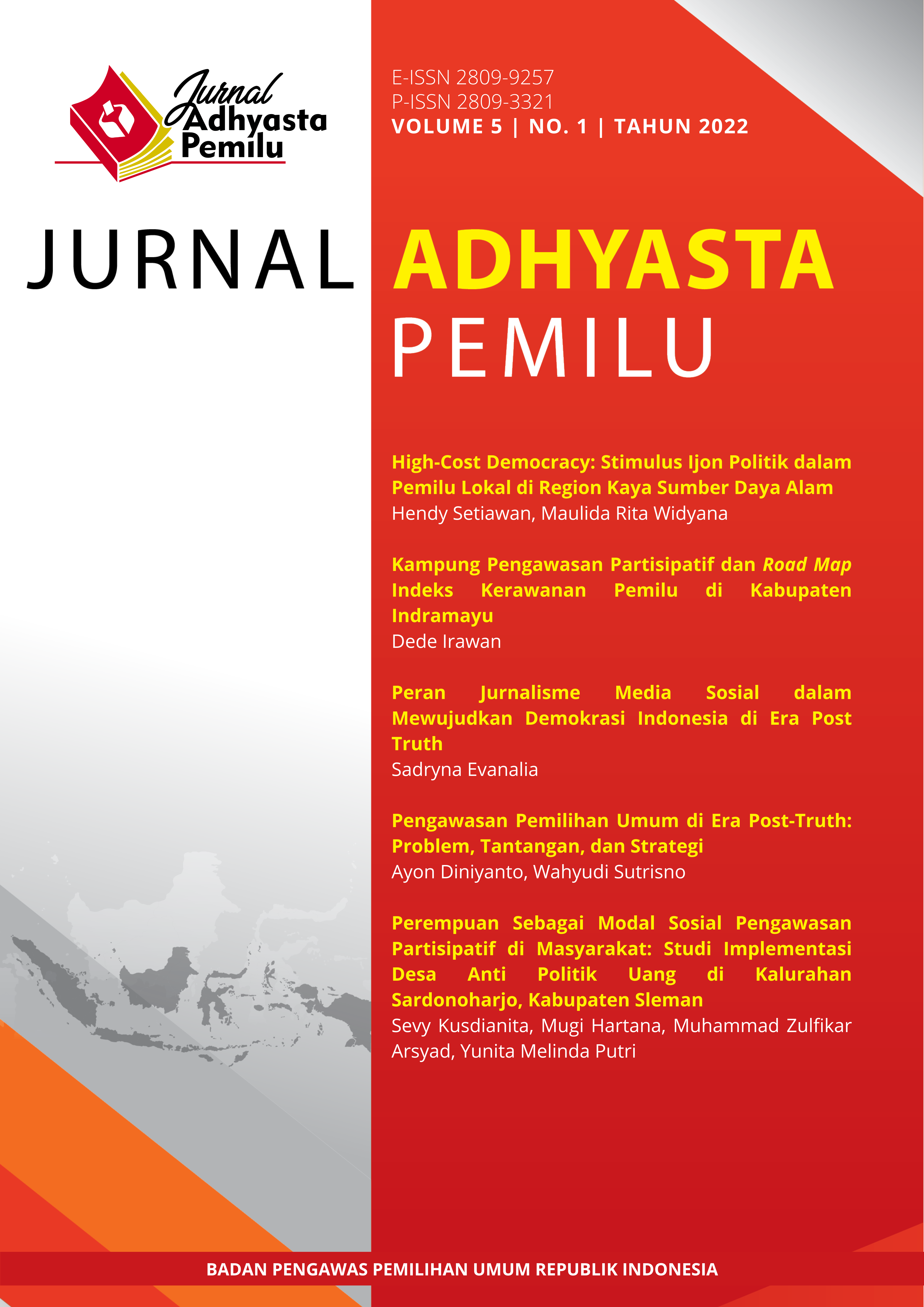Kampung Pengawasan Partisipatif dan Road Map Indeks Kerawanan Pemilu di Kabupaten Indramayu
DOI:
https://doi.org/10.55108/jap.v5i1.85Kata Kunci:
participatory monitoring village, election vulnerability index, participatory monitoring, prevention of election violationsAbstrak
This study aims to determine the effectiveness of the participatory monitoring village program in preventing election violations. This research uses a qualitative method with a case study approach that analyzes the phenomenon of election supervision, election violations in the implementation of the 2019 Election and the 2020 Pilkada associated with the participatory monitoring village program which establishes the rambatan wetan village as a pilot project for the participatory monitoring center with the consideration that the wetan rambatan village is a zero village. offense and close to the city center. The results of the study show that the participatory monitoring village program does not consider data on election violations and the election vulnerability index in the 2020 elections so that its implementation is predicted to be less than optimal in preventing and suppressing election violations, the program should be mapped to villages with minimal knowledge, low participation and villages that have The potential for high vulnerability to violations is placed in several villages so that they can become a catalyst for Bawaslu in mapping and compiling an election vulnerability index in stages so that potential vulnerabilities can be prevented. The Participatory Monitoring Village Program should be optimized by paying attention to data on violations and vulnerabilities in order to prepare for the 2024 election design which is predicted to be very complex, because Election Oversight, potential violation vulnerabilities and the election vulnerability index are components that cannot be separated as an instrument of election supervision.
Unduhan
Referensi
Amalia, P. C. (2017). Model Penyelesaian Sengketa Alternatif dalam Sengketa Administrasi Pemilihan Umum di Provinsi Jawa Timur dan Daerah Istimewa Yogyakarta. (Universitas Airlangga). Universitas Airlangga. Diambil dari http://repository.unair.ac.id/id/eprint/67870
Andriyana, A. (2021). Bawaslu Canangkan Kampung Pengawasan Partisipatif. Diambil 5 Mei 2022, dari Fajar Cirebon website: https://fajarcirebon.com/bawaslu-canangkan-kampung-pengawasan-partisipatif/
Aspinall, E., & Mietzner, M. (2019). Indonesia’s Democratic Paradox: Competitive Elections amidst Rising Illiberalism. Bulletin of Indonesian Economic Studies, 55(3), 295–317. https://doi.org/10.1080/00074918.2019.1690412
Bawaslu. (2019). Buku Saku Pemantauan Pemilihan Umum 2019. Bawaslu.
Bawaslu. (2020). Indeks Kerawanan Pemilu (IKP) Pilkada Serentak 2020. Bawaslu.
Bawaslu Kabupaten Indramayu. (2020). Data Pelanggaran Pemilu 2019 dan Pilkada Indramayu tahun 2020. Diambil dari https://indramayukab.bawaslu.go.id/
Boudreau, V. (1999). Diffusing Democracy? People Power in Indonesia and the Philippines. Bulletin of Concerned Asian Scholars, 31(4), 3–18. https://doi.org/10.1080/14672715.1999.10415762
Buehler, M., Nataatmadja, R., & Anugrah, I. (2021). Limitations to Subnational Authoritarianism: Indonesian Local Government Head Elections in Comparative Perspective. Regional and Federal Studies, 31(3), 381–404. https://doi.org/10.1080/13597566.2021.1918388
Fatlolon, C. (2016). Pancasila Democracy and the Play of the Good. FILOCRACIA, 3(1), 70–92.
Fionna, U., & Hutchinson, F. E. (2019). Indonesia’S 2019 Elections: A Fractured Democracy? Asian Affairs, 50(4), 502–519. https://doi.org/10.1080/03068374.2019.1672400
Freedman, A., & Tiburzi, R. (2012). Progress and Caution: Indonesia’s Democracy. Asian Affairs(UK), 39(3), 131–156. https://doi.org/10.1080/00927678.2012.704832
Habibi, M. (2021). Pandemic Democracy: Impact Regional Elections Held During the COVID-19 Pandemic. Journal Government and Political Issues, 1(1), 15–25. https://doi.org/10.53341/jgpi.v1i1.1
Hadiz, V. R. (2004). Decentralization and Democracy in Indonesia: A Critique of Neo-Institutionalist Perspectives. Development and Change, 35(4), 697–718. https://doi.org/10.1111/j.0012-155X.2004.00376.x
Nur Wardhani, P. S. (2018). Partisipasi Politik Pemilih Pemula dalam Pemilihan Umum. Jupiis: Jurnal Pendidikan Ilmu-Ilmu Sosial, 10(1), 57. https://doi.org/10.24114/jupiis.v10i1.8407
Prasetyo, A. S., Priyono, A., & Tornquist, O. (2003). Indonesia’s Post Suharto Democracy Movement. Jakarta: Demos.
Primayogha, E. (2022). Pengawas Pemilu Berintegritas. Dipresentasikan pada Diskusi Kelompok Terpumpun (DKT) ”Model Kompetensi dan Skema Pelatihan Pengawas Pemilu”, Jakarta.
Qodari, M. (2010). The Professionalisation of Politics: The Growing Role of Polling Organisations and Political Consultants. Dalam E. Aspinall & M. Mietzner (Ed.), Problems of Democratisation in Indonesia: Elections, Institutions and Society (hlm. 122–140). Singapore: Institute of Southeast Asian Studies.
Raco, J. (2018). Metode Penelitian Kualitatif: Jenis Karakteristik dan Keunggulannya [Preprint]. Open Science Framework. https://doi.org/10.31219/osf.io/mfzuj
Rozuli, A. I., & Haboddin, M. (2018). Pendidikan Pemilih dan Penguatan Demokrasi. Politea : Jurnal Politik Islam, 1(2), 129–148. https://doi.org/10.20414/politea.v1i2.818
Saufi, A., Faiz, A., & Yanuar, M. R. (2020). Sekolah Kader Pengawas Partisipatif Daring Sebagai Sarana Pendidikan Pemilu dan Pilkada di Tengah Pandemi Covid-19. JCES (Journal of Character Education Society), 3(3), 486–500. https://doi.org/10.31764/jces.v3i3.2400
Spaiser, V., Ranganathan, S., Mann, R. P., & Sumpter, D. J. T. (2014). The Dynamics of Democracy, Development and Cultural Values. PLoS ONE, 9(6), e97856. https://doi.org/10.1371/journal.pone.0097856
Sustikarini, A. (2020). Digital Democracy in Indonesia’s 2019 Election: Between Citizen Participation and Political Polarization. International Conference on Agriculture, Social Sciences, Education, Technology and Health (ICASSETH 2019), 429, 238–242. Atlantis Press. https://doi.org/10.2991/assehr.k.200402.055
The Economist Intelligence Unit. (2021). Democracy Index 2020: In Sickness and in Health? (hlm. 75). London: The Economist Intelligence Unit. Diambil dari The Economist Intelligence Unit website: https://www.eiu.com/public/topical_report.aspx?campaignid=democracy2020
Undang-Undang Nomor 7 Tahun 2017 Tentang Pemilihan Umum. , Pub. L. No. 7 (2017).
Undang-Undang Nomor 10 Tahun 2016 Tentang Pemilihan Kepala Daerah. , Pub. L. No. 10 (2016).
Wibawa, K. C. S. (2019). Pengawasan Partisipatif untuk Mewujudkan Good Governance dalam Penyelenggaraan Pemilihan Umum Serentak di Indonesia. Administrative Law and Governance Journal, 2(4), 615–628. https://doi.org/10.14710/alj.v2i4.615-628
Widhoroso, W. (2020). Sistem Demokrasi di Indonesia Dinilai Sudah Berjalan Baik. Media Indonesia. Diambil dari https://mediaindonesia.com/politik-dan-hukum/358675/sistem-demokrasi-di-indonesia-dinilai-sudah-berjalan-baik
Widianingsih, I., & Morrell, E. (2007). PARTICIPATORY PLANNING IN INDONESIA: Seeking a New Path to Democracy. Policy Studies, 28(1), 1–15. https://doi.org/10.1080/01442870601121320
Yahya, A. N. (2020). Survei Indo Barometer: 56,4 Persen Responden Puas atas Jalannya Demokrasi Indonesia. Diambil dari https://nasional.kompas.com/read/2020/11/05/12385361/survei-indo-barometer-564-persen-responden-puas-atas-jalannya-demokrasi?page=all
Yustiningrum, Emilia, R., Ichwanuddin, & Wawan. (2015). Partisipasi Politik dan Perilaku Memilih pada Pemilu 2014. Jurnal Penelitian Politik, 12(1), 117–135. https://doi.org/10.14203/jpp.v12i1.533
Unduhan
Diterbitkan
Cara Mengutip
Terbitan
Bagian
Lisensi
Hak Cipta (c) 2022 Dede Irawan

Artikel ini berlisensi Creative Commons Attribution 4.0 International License.



